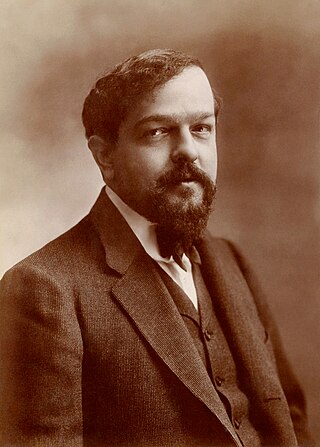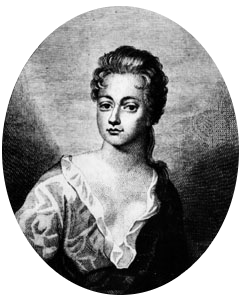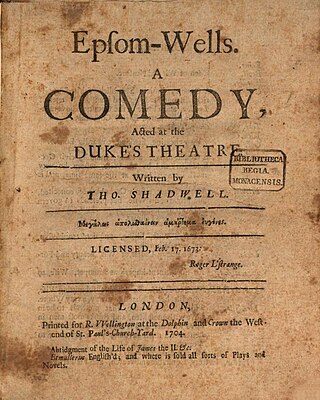Related Research Articles

(Achille) Claude Debussy was a French composer. He is sometimes seen as the first Impressionist composer, although he vigorously rejected the term. He was among the most influential composers of the late 19th and early 20th centuries.

Sir Charles Hubert Hastings Parry, 1st Baronet, was an English composer, teacher and historian of music. Born in Richmond Hill, Bournemouth, Parry's first major works appeared in 1880. As a composer he is best known for the choral song "Jerusalem", his 1902 setting for the coronation anthem "I was glad", the choral and orchestral ode Blest Pair of Sirens, and the hymn tune "Repton", which sets the words "Dear Lord and Father of Mankind". His orchestral works include five symphonies and a set of Symphonic Variations. He also composed the music for Ode to Newfoundland, the Newfoundland and Labrador provincial anthem.

Olivier Eugène Prosper Charles Messiaen was a French composer, organist, and ornithologist. One of the major composers of the 20th century, he was also an outstanding teacher of composition and musical analysis.
Master of the King's Music is a post in the Royal Household of the United Kingdom. The holder of the post originally served the monarch of England, directing the court orchestra and composing or commissioning music as required.
Events from the year 1672 in literature.

Charles Louis Ambroise Thomas was a French composer and teacher, best known for his operas Mignon (1866) and Hamlet (1868).
The Locrian mode is the seventh mode of the major scale. It is either a musical mode or simply a diatonic scale. On the piano, it is the scale that starts with B and only uses the white keys from there on up to the next higher B. Its ascending form consists of the key note, then: Half step, whole step, whole step, half step, whole step, whole step, whole step.

Marriage à la Mode is a Restoration comedy by John Dryden, first performed in London in 1673 by the King's Company. It is written in a combination of prose, blank verse and heroic couplets. It has often been praised as Dryden's best comedic endeavour, and James Sutherland accounts for this by observing that "the comic scenes are beautifully written, and Dryden has taken care to connect them with the serious plot by a number of effective links. He writes with ... one of the most thoughtful treatments of sex and marriage that Restoration comedy can show."

Anne Bracegirdle was an English actress and soprano. Most of the plays she performed in involved singing as well as acting. She often performed music written for her by the composer John Eccles, and also sung music written for her by Henry Purcell. She became particularly well known for the song "I burn" which Eccles originally wrote for Bracegirdle to perform in Thomas D'Urfey's play The Comical History of Don Quixote (1694). She also sang music by Eccles in the play The Richmond Heiress (1693) and in William Congreve opera The Judgment of Paris. In 1706 she starred in Giuseppe Fedeli's opera The Temple of Love.
Guillaume-Gabriel Nivers was a French organist, composer and theorist. His first livre d'orgue is the earliest surviving published collection with traditional French organ school forms. Nivers's other music is less known; however, his treatises on Gregorian chant and basso continuo are still considered important sources on 17th century liturgical music and performance practice.
Elizabeth Boutell, was a British actress.

Johann Kuhnau was a German polymath, known primarily as a composer today. He was also active as a novelist, translator, lawyer, and music theorist, and was able to combine these activities with his duties in his official post as Thomaskantor in Leipzig, which he occupied for 21 years. Much of his music, including operas, masses, and other large-scale vocal works, is lost. His reputation today rests on his Biblical Sonatas, a set of programmatic keyboard sonatas published in 1700, in which each sonata depicted in detail a particular story from the Bible. After his death, Kuhnau was succeeded as Thomaskantor by Johann Sebastian Bach.
Francis Hueffer was a German-English writer on music, music critic, and librettist.

Maria Wilhelmine von Thun und Hohenstein, born Uhlfeldt was a Viennese countess. She is remembered as the sponsor of a musically and intellectually outstanding salon and for her patronage of music, notably that of Mozart and Beethoven.

Edward James Loder was an English composer and conductor. His best remembered work is perhaps the 1855 opera Raymond and Agnes, though his most successful opera during his lifetime was The Night Dancers.

Thomas Tudway was an English musician and Professor of Music at Cambridge University. He is known as a composer, and for his compilation of a collection of Anglican church music.

Epsom Wells is a 1672 restoration comedy by the English writer Thomas Shadwell. It was the first in a line of plays set in spa towns. The incidental music was composed by Nicholas Staggins. In the 1690s Henry Purcell scored a new staging of the play. It was performed at the Dorset Garden Theatre by the Duke's Company. The cast included Henry Harris as Rains, Thomas Betterton as Bevil, William Smith as Woodly, Cave Underhill as Justice Clodpate, Anne Gibbs as Lucia, Mary Betterton as Mrs Jilt, James Nokes as Bisket and Edward Angel as Fribble.
Elizabeth "Betty" Cox was an English stage actress of the seventeenth century.
Marmaduke Watson was an English stage actor of the seventeenth century. Part of the King's Company based at the Theatre Royal, Drury Lane, he was one of the actors who sided with Charles Killigrew during a dispute in the company in 1677. In 1682 when the United Company was formed he left and went to Dublin to join the Smock Alley Theatre. He later returned to London where his final known performances were with Thomas Betterton's company at the Lincoln's Inn Fields Theatre.
References
- ↑ Highfill, Philip H.; Burnim, Kalman A.; Langhans, Edward A. (1973). "Staggins, Nicholas". A Biographical Dictionary of Actors, Volume 14, S. Siddons to Thynne. SIU Press. p. 233. ISBN 9780809315260.
- ↑ "Staggins, Nicholas (STGS682N)". A Cambridge Alumni Database. University of Cambridge. Slightly different dates are given in A Biographical Dictionary of English Court Musicians, 1485–1714.
- ↑ Luttrell, Narcissus (1857). A Brief Relation of State Affairs. At the University Press.[ page needed ]